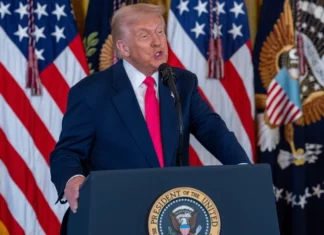In a recent development reported by The Washington Post, it has come to light that Mike Waltz, a national security advisor to former President Donald Trump, utilized his private Gmail account for government communications. This revelation raises significant concerns about the security and handling of sensitive information within the Trump administration.
Use of private email accounts for official government matters has been a contentious issue in American politics, prominently highlighted during Hillary Clinton’s presidency campaign when she faced scrutiny for using her private email server for official communications while serving as Secretary of State. The implications surrounding the use of personal email for government business include potential breaches of security and a lack of transparency that can impede accountability.
Waltz’s situation is further complicated by his involvement in a separate controversy surrounding the messaging app Signal, known for its encrypted communications. The Signal scandal, which has captured media attention, centers on allegations that members of Trump’s administration may have used the app for discussions that circumvented official channels. This secrecy in communication raises questions about accountability and ethics in governance.
The combination of these two issues—the use of a personal email account for government business and the potential misuse of an encrypted messaging platform—paints a troubling picture of the communication practices within the Trump administration. Critics argue that such practices not only threaten national security but also undermine the public’s trust in government officials.
In an era where cyber threats are increasingly sophisticated, the use of private accounts for sensitive communications can expose both the government and the public to risks. The lack of a full accountability mechanism for communications held outside of official channels can result in significant gaps in oversight and the ability to track decision-making processes effectively.
Proponents of stricter regulations around government communications underscore the need for clear boundaries regarding what platforms and accounts are appropriate for official use. This incident emphasizes the importance of ensuring that government officials abide by established protocols designed to safeguard classified and sensitive information.
Waltz’s actions may also prompt a renewed discussion on the necessity for policies that protect against the misuse of technology in government settings. As technology evolves, lawmakers must adapt regulations to protect national security interests while ensuring that transparency and accountability remain cornerstones of government operations.
In conclusion, the findings related to Mike Waltz’s use of a private Gmail account for government communications and his involvement in the Signal controversy reflect broader systemic issues within the Trump administration. As discussions continue regarding the implications of these practices, it becomes imperative for lawmakers to revisit and possibly reform the policies that dictate how government officials communicate sensitive information. If the goal is to maintain public trust and national security, it is essential to enforce strict standards that prevent the misuse of personal communication channels in context with governmental duties. This matter serves as a critical reminder of the importance of upholding the integrity and security of government communication processes.






